Cite this document
(Russia in a Globalizing World Essay Example | Topics and Well Written Essays - 1250 words, n.d.)
Russia in a Globalizing World Essay Example | Topics and Well Written Essays - 1250 words. https://studentshare.org/macro-microeconomics/1553152-to-what-extent-has-globalization-influenced-one-or-more-aspects-of-the-culture-in-your-country-illustrate-your-answer-with-examples
Russia in a Globalizing World Essay Example | Topics and Well Written Essays - 1250 words. https://studentshare.org/macro-microeconomics/1553152-to-what-extent-has-globalization-influenced-one-or-more-aspects-of-the-culture-in-your-country-illustrate-your-answer-with-examples
(Russia in a Globalizing World Essay Example | Topics and Well Written Essays - 1250 Words)
Russia in a Globalizing World Essay Example | Topics and Well Written Essays - 1250 Words. https://studentshare.org/macro-microeconomics/1553152-to-what-extent-has-globalization-influenced-one-or-more-aspects-of-the-culture-in-your-country-illustrate-your-answer-with-examples.
Russia in a Globalizing World Essay Example | Topics and Well Written Essays - 1250 Words. https://studentshare.org/macro-microeconomics/1553152-to-what-extent-has-globalization-influenced-one-or-more-aspects-of-the-culture-in-your-country-illustrate-your-answer-with-examples.
“Russia in a Globalizing World Essay Example | Topics and Well Written Essays - 1250 Words”. https://studentshare.org/macro-microeconomics/1553152-to-what-extent-has-globalization-influenced-one-or-more-aspects-of-the-culture-in-your-country-illustrate-your-answer-with-examples.


